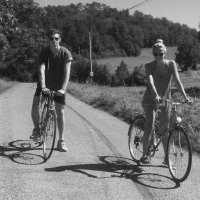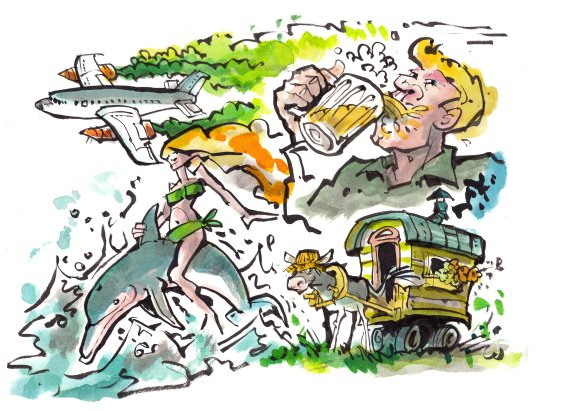Illustration: Henk van Ruitenbeek
Jiahui Yu, Msc student of Urban Environmental Management
‘I’m from China and I fly home once or twice a year. It’s a long flight and not very sustainable. However, my priority is seeing my family. I still want to go home, so never taking a plane would not be an option. Here in Wageningen, I can learn how to solve environmental problems in China, and travelling around the world also teaches you a lot, even though you have to fly for it. Staying put is not the solution. Within Europe, I often take the bus rather than fly somewhere, but more because of comfort than for environmental reasons.’
–

**Tijmen Wiegersma, MSc student of Molecular Life Sciences
‘I’m a member of a youth nature society called WoesteLand. We organize nature holidays that often have a sustainable or nature-related theme. We work outdoors during the day for the nature management agency Staatsbosbeheer for example, in exchange for which we get to stay in amazing locations. We also eat vegetarian and organic food. We do sometimes go abroad but always to places you can get to by bus or train. You don’t have to go far to see interesting things. I almost never fly; I prefer to carpool or hitchhike. But I do dream of going to Iceland for example and then I would have to fly.’

Yorick Vink, MSC student of Urban Environmental Management
‘I do think about sustainability when considering where to go on holiday, but it’s not my only criterion. I usually try to go by train or bus. I’ve gone hitchhiking twice. That’s sociable, free and sustainable. It’s an interesting contradiction that people who think about sustainability a lot are also often the ones who want to explore the world. Unfortunately if you want to travel far, you have to fly. That stops me doing it sometimes, but not always.’
–
–
Aleid Teeuwen, BSc student of Plant Sciences
‘A few years ago, I looked at how I could reduce my personal impact on the environment. The two biggest sources of environmental damage are flying and eating meat. So I stopped doing those two things. I come from Oslo and I go back to Norway about twice a year. I always take the bus for that trip. I use the bus or train for all my other holidays too, and if that doesn’t work out I carpool or hitch a lift. The bus costs more and takes longer but I’m prepared to make that sacrifice. I don’t even look at plane tickets so I can’t make that comparison. Perhaps I’d have to fly if I wanted to travel really far. But if it’s for a stay of more than six months, I find that acceptable.’

Fabian Verhage, MSc student of Climate Studies
‘I had to go to Brazil last year for my Master’s thesis. I didn’t want to fly because I don’t want to be responsible for climate change. At first I thought of a sailing boat but that’s expensive and would take a month. Eventually I went to Brazil by container ship. That took two weeks. I was going to take a cruise ship for the return journey but I broke my leg so I had to fly anyway. I’m currently working on sustainable air and sea transport for my internship. I would advise people not to fly within Europe as that’s irresponsible. Compensation helps a bit, mainly because it shows airlines that passengers find the climate important. That’s relevant because planes could eventually switch to biofuel. At any rate, you won’t find me on a plane again any time soon; this summer I’m going sailing.’
Watch a video report of Fabian’s journey by container ship here.

Dieke Schutjens, MSc student of Climate Studies
‘This summer I’ll be attending the Climate-KIC Summer School on sustainable entrepreneurship. The organization advised us to use sustainable transport to reach the starting location and return from the final destination. However, the return journey from Helsinki was difficult enough by plane; there weren’t many other options. I could have taken the train for the outward journey but that didn’t work out: my boyfriend comes back from his trip the day before and I want to see him for a day before I set off. So I’ll be flying after all — which is cheaper too. Of course I’ll be compensating. I selected climate compensation by Hivos, in which you support a biogas project in Cambodia. But I’m sceptical about the effect of the compensation because the costs are so low even then.’

Timon Weitkamp, MSc student of International Land and Water Management and GIS
‘In a couple of weeks I’ll be flying with my year group to Bulgaria, where we’ll hire a van.
We’ve got visits to a castle, a nature park, a city and a sunny beach on our itinerary. We don’t have too many other options given that we’re only together for eight days. If we went by train we’d never be able to visit so many places. I normally like to travel by public transport, preferably the same way the locals do in that country. But with this trip we didn’t feel like making things more difficult for ourselves.’

Alex Crump, Former intern at Eleaf Wageningen
‘After my internship, I decided to go on a cycling holiday through Europe, from Amsterdam to Athens.
Unfortunately, I didn’t get further than the Czech Republic. Cycling on the flat went fine but the inclines in the Harz Mountains damaged my knee. Now I have a plan to go cycling in France but I’ve also realized that bikes are mainly good for getting around towns. For long distances I prefer to combine cycling with the train. My principle is only to travel by plane if I’m going to be staying somewhere for a longer period. Otherwise it’s not worth the “true costs”.’

